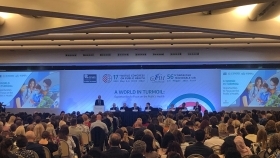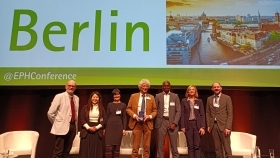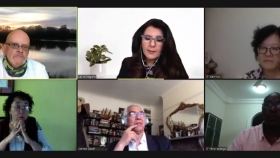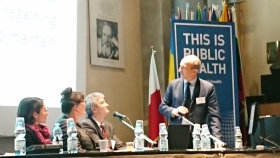
by strengthening education and training
of public health professionals
for both practice and research



The Association of Schools of Public Health in the European Region (ASPHER)
ASPHER is the key independent European organisation dedicated to strengthening the role of public health by improving education and training of public health professionals for both practice and research.Secretariat updates
It has been a year since the Russian invasion of Ukraine on 24 February 2022 brought violence to Europe on a scale not seen since the Second World War. The overall toll of dead and wounded, as well as the scale of the refugee crisis caused by this war, is stunning – see Table 1.
Table 1. Human losses and refugee crisis in numbers – the first anniversary of starting the full-scale invasion of Ukraine by Russia (source: Business Insider:
https://www.businessinsider.com/ukraine-war-in-numbers-year-russia-invasion-deaths-aid-tanks-2023-2?IR=T.)
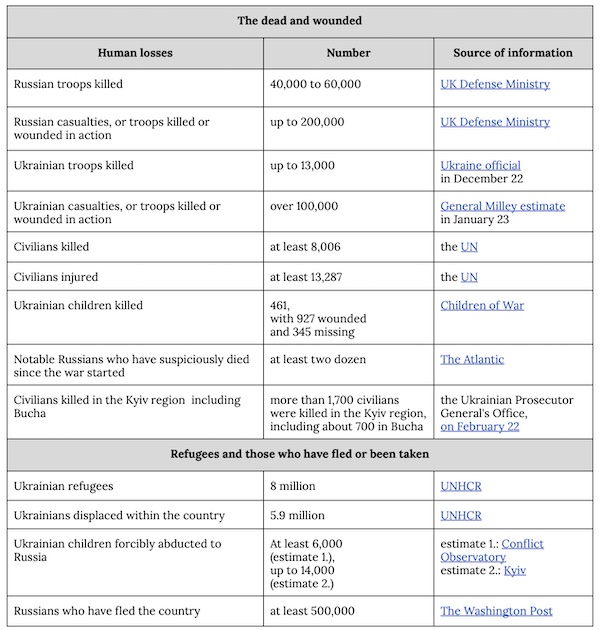
After twelve months of open war (the conflict actually started much earlier, in 2014 - but in a form which has been then called a hybrid war) the number of suspected war crimes committed by Russia’s military has amounted to 65,000, according to the Ukraine's Prosecutor General and the EU Justice Commissioner. The cost of damage to the Ukraine’s economy and infrastructure exceeds $700 billion, per Ukrainian Prime Minister Denys Shmyhal. The Russian military aggression is directed not only at military targets. It intentionally targets civilians and civilian infrastructure, especially critical facilities (e.g. electricity grid). Moreover, it also intentionally aims to destroy Ukraine’s cultural heritage determining the nation’s distinctiveness and identity (https://www.youtube.com/watch?v=KUgRbY1k1YI).
However, the devastations brought by the Russian invasion has been met by the gradually increasing support provided by many foreign states to Ukraine. When measured in financial terms, the total amount of aid, including humanitarian, financial, and military, has amounted to $76.8 billion from the USA (the Kiel Institute for the World Economy), and $58.2 billion from the European Union (the Kiel Institute).
At the start of the aggression, in ASPHER’s Statement on the War Against Ukraine: The Role of Europe’s Schools of Public Health in Times of War, ASPHER warned of the devastating impacts of war on the health of populations, and reminded the Russian military of their obligation to the United Nations’ Humanitarian Law and WHO Resolution on Attacks on Health Care. The resolution aims at ensuring that essential life-saving health services, including public health, are provided to emergency-affected populations unhindered by any form of violence or obstruction. However, in the year that has followed, violence against the Ukrainian health care system has been a prominent feature of Russia’s unlawful conduct targeting civilian infrastructure.
Russia’s targeting of Ukraine’s health care system has been documented in a joint report from eyeWitness to Atrocities (eyeWitness), Insecurity Insight, the Media Initiative for Human Rights (MIHR), Physicians for Human Rights (PHR), and the Ukrainian Healthcare Center (UHC) - counting a total of 707 attacks on Ukraine’s health care system from the start of the conflict through 31 December 2022. In its health needs assessment, WHO found that half of health care seekers in Ukraine faced at least one barrier to care. But despite the attacks and the logistical challenges, WHO’s assessment recognized that the country’s health system remains resilient and that overall access to some level of health services is still high. Of those who sought care, 95% reported having received primary care services and up to 90% had access to health services for chronic conditions. Moreover, 93% had access to a family doctor.
Meanwhile, the war and its consequences are taking a heavy toll on Ukrainians' mental health with WHO estimating that nearly 10 million Ukrainians may be suffering from diagnoseable mental health conditions and a poll of Ukraine's Ministry of Health finding that more than 70% of people said they were very stressed or nervous. Ukraine’s First Lady, Olena Zelenska, has championed the cause of mental health with an initiative to create the All-Ukrainian Mental Health Programme. The government – together with more than 200 partners on the ground – has rapidly stepped up investments in, and delivery of, mental health and psychosocial support, both on the national and, most importantly, local or community level.
Figure 1. Ukraine Refugee Situation in the European Union (source:
https://home-affairs.ec.europa.eu/policies/migration-and-asylum/migration-management/migration-management-welcoming-refugees-ukraine_en)
Mass displacements of 6 million people have taken place within Ukraine as well as movement out of the country of nearly 8 million refugees fleeing - over 4 million have filed for Temporary Protection in the EU (Figure 1, see also Table 1). Europe as a whole has responded to the needs of these people with unparalleled and historic support. As can be seen in Figure 2, the influx of the Ukrainian war refugees must have created the significant challenges for the host countries in Europe. This has changed their demographic characteristics on a scale, and in a tempo, which were unimaginable before the current war’s nightmare has begun. As so far, apparently the European nations have stood up to that great challenge, and let’s hope that this will continue until the just peace prevails in Ukraine.
Figure 2. The distribution of the Ukrainian war refugees across the European countries (source: https://coebank.org/media/documents/Integration_of_Refugees_Fleeing_the_Invasion_of_Ukraine.pdf).
Refugees from Ukraine need both general and specialised healthcare, increasing the demand on host countries’ already-stretched systems. Low vaccination rates, high levels of infectious diseases and war-related injuries among refugees have placed new pressures on host country systems, still strained due to the Covid-19 pandemic. While healthcare systems have worked to respond to some of the concerns (e.g. a vaccination roll-out strategy), other issues, such as a shortage of healthcare workers and mental healthcare professionals, are being addressed to respond to refugees’ healthcare needs. European solidarity has helped mobilise collective responses to bolster health systems in countries with the largest inflows with EU countries hosting fewer people fleeing the war in Ukraine allowing for the transfer of patients to their less strained healthcare facilities. This has been most acutely helpful in relieving the pressure on the over-exerted Polish healthcare system. Moreover, countries are exploring new policies and measures to help strengthen health systems – such as incorporating refugees with healthcare professional backgrounds into host country systems. (https://coebank.org/media/documents/Integration_of_Refugees_Fleeing_the_Invasion_of_Ukraine.pdf).
ASPHER and our members have responded as well, heeding the call in the ASPHER statement for five-fold action: (1) Discovery and dissemination of facts; (2) Diplomacy, mediation, and conflict transformation; (3) Solidarity and support; (4) Use of health-related superordinate goals; and (5) Dissent and non-cooperation with institutions that are associated with rights violations.
To support these goals, ASPHER established the Task Force on War focusing on three key areas: 1) Scientific advisement; 2) Neighboring countries and refugee context; 3) Training and broader academic context. The work of the Task Force including special conferences, webinar series on Public health in times of war, and publications can be found here. ASPHER member schools - Jagiellonian University Medical College (JUMC) in Krakow, Poland, the School of Public Health Management (SPHM) of the Republic of Moldova in Chisinau, and the EHESP School of Public Health in Rennes - have also signed the agreements strengthening their collaboration and supporting continuity of training in the emergency context of the Ukrainian crisis with financial support, education exchange and placements for Ukrainian students and researchers (https://www.aspher.org/download/1182/aspher-newsletter-july-august-2022.pdf; https://izp.wnz.cm.uj.edu.pl/en/aktualnosci/a-bilateral-agreement-between-public-health-institutions-from-poland-and-france-in-the-emergency-context-of-the-war-in-ukraine/; and https://izp.wnz.cm.uj.edu.pl/en/aktualnosci/public-health-academic-institutions-from-poland-moldova-and-france-tighten-their-academic-cooperation-in-reaction-to-war-in-europe/).
Photo caption: Laurent Chambaud, former Head of École des Hautes Etudes en Santé Publique (EHESP), France; Tomasz Grodzicki, Vice-Rector of the Jagiellonian University for Medical College (JUMC); and Dorota KÅ‚yÅ›, Vice-Bursar of the Jagiellonian University for Medical College (JUMC), sign a bilateral agreement on 20 July 2022 in Krakow, to support Ukrainian refugee students and researchers by financial and operational modalities of collaboration.
Due to the just started war (one month after its onset), the agenda of the Annual meeting of the Association of Schools and Programs of Public Health (ASPPH), an organization which closely cooperates with ASPHER, was modified in order to include the topics related to war on the other side of the Atlantic Ocean. The voice from Europe, including directly from Ukraine, was heard on a forum of hundreds of American public health academicians. This coincided with the closing of the first edition of the campaign aiming to spread awareness of public health in academia and among societies, called This Is Public Health GLOBAL.
Later, three months after the outbreak of the Russian-Ukrainian war, another important international conference was organized under the auspices of ASPHER in Gdansk, Poland by Gdansk Medical University with hybrid form of participation. During this meeting, public health academic community members from Ukraine were able to provide their first-hand testimonies on the atrocities of war, and describe their efforts to cope with hardships of everyday life (full recording can be found at: https://www.youtube.com/watch?v=SV0IS3grpUw&t=15636s).
Photo caption: Professor Tetiana Yurochko, Head of the School of Public Health. National University of Kyiv-Mohyla Academy addresses the International Conference at Gdansk Medical University in Gdansk, Poland on 20 May 2022.
As the follow-up of this conference, the whole issue of the Polish scientific journal “Public Health and Governance” (Zdrowie Publiczne i ZarzÄ?dzanie), 2022, Volume 20, Issue 1 was dedicated to war in Ukraine with its impacts and consequences (available for download at: https://www.ejournals.eu/Zdrowie-Publiczne-i-Zarzadzanie/2022/Tom-20-zeszyt-1/).
The mobilization of the academic environment in reaction to the war in Europe, its dynamics and tempo, as well as the kind of reactions to war’s consequences and impacts, went in parallel with the reactions and actions undertaken by the many European states’ societies. This was dependent in much degree on the actual geographical proximity to the war area, historical and geopolitical considerations, formerly existing exposition to foreign influences in the globalized world, level and quality of information on the current situation in the eastern part of the European continent, international economic ties, and many other factors. Nevertheless, the level of humanitarian support provided to the suffering Ukrainian citizens and refugees by the European nations was unprecedented. Its scale turned out to be huge and difficult to imagine before the 24th of February 2022.
Sadly, it is difficult to predict how long this military conflict will last. Until 2022, the majority of Ukrainians didn’t believe that any full-scale military aggression on their country would be possible. All peace-loving humans, including first of all the Ukrainian civilians suffering every day from war situation hardships, and the Ukrainian refugees who are spread now among foreign countries throughout Europe and elsewhere, away from their homes, hope for the best, and hope for that happening soon. The realistic hopes should be for a durable and just peace, not a pause in a war allowing the aggressor state to gather strength with aim to hit even harder, more comfortably and with more “effective” and destructive weapons - thus continuing the unseen for decades policy of changing state borders by force, and revitalizing the worst memories and experiences of the turbulent history of the European continent. In a globalized world, not only public health professionals continuously learn, but the dictatorships do so as well. A success of aggression and forceful way of conduct adopted in one site of our small planet, could be repeated with high probability somewhere else soon, as well.
The full-scale invasion of Ukraine a year ago represents a disturbing escalation of Russian tactics used in countries in the region. Even now, we are witnessing Russia's attempt to destabilise other countries, extending hybrid warfare to the Balkans and especially to Moldova. Despite severe economic hardships created by its opposition to Russia and other collateral damage, Moldova has remained strong with its parliament issuing a declaration condeming Russia for the war on Ukraine. As an international community, it is imperative that we join forces to support Ukraine in its efforts to defend its territorial integrity.
ASPHER is deeply worried about a further escalation of the war and the possible use of weapons of mass destruction. As public health professionals, we realize that we may not be able to provide care for all the victims of even a limited use of nuclear weapons (Lopes, H., Middleton, J., & Razum, O. (2022). Preparing for what we abhor: an obligation of public health professionals. The Lancet, 399(10342), 2187. https://doi.org/10.1016/S0140-6736(22)00889-3). ASPHER calls on Russia to abstain from using such weapons or threatening their use, and re-enter negotiations of reducing nuclear weapons.
It should be mentioned that ASPHER has backed up the call from Hans Kluge of WHO Europe, that after a year of tremendous courage by the people of Ukraine, this is not the time to let fatigue win. Schools of Public Health and ASPHER must continue to stand in solidarity with Ukraine and its health workforce promoting “healthy and peaceful societies” based on the values of social accountability and health equity – reinforcing sustainable response, strengthening local capacities with sensitivity to local communities’ needs including mental health. ASPHER will be taking time to reflect on how it can be stronger for the future and we welcome input from our members on concrete actions we may support.
And finally and most emphatically; ASPHER calls on Russia to cease attacks on Ukrainian civilians, civilian infrastructure including healthcare facilities and workers, end the aggression, and withdraw completely from Ukraine.
Link to the ASPHER Task Force on War.
Terms of use · Transparency statement ·Tel: +32 2 735 0890 ·Skype: ASPHERskype ·Mail: office@aspher.org ·Share:
ADDRESS
Aspher SecretariatUM Brussels Campus
Av de l'Armée / Legerlaan 10
BE-1040 Brussels


